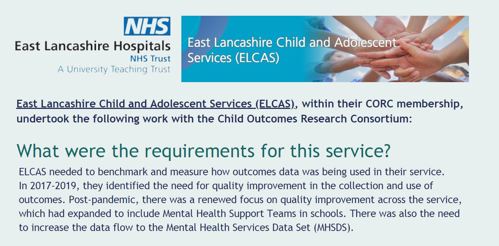Within their membership, East Lancashire Child and Adolescent Services (ELCAS) undertook the following work with the Child Outcomes Research Consortium:
What were the requirements for this service?
ELCAS needed to benchmark and measure how outcomes data was being used in their service.
In 2017-2019, they identified the need for quality improvement in the collection and use of outcomes. Post-pandemic, there was a renewed focus on quality improvement across the service, which had expanded to include Mental Health Support Teams in schools. There was also the need to increase the data flow to the Mental Health Services Data Set (MHSDS).
What support did CORC provide?
CORC supported ELCAS to self assess practice within the service using the Best Practice Framework and CORC Staff Practice and Attitudes Survey in 2017 and 2019. To support with service improvement, ELCAS set up a working group for routine outcome measurement which was attended by their CORC Regional Improvement Officer. CORC also delivered training on specific measurement tools to support staff development.
In 2023, CORC has been working with ELCAS to provide external analysis of their data and to explore staff knowledge and their experience of using outcome and experience measures using the CORC Staff Practice and Attitudes Survey.
What was the impact?
Service improvements in data collection and moving towards systematic use of patient-reported outcome measures were evidenced in the Staff Practice and Attitudes survey. In 2023, the survey demonstrated further improvements in staff development and in sharing outcomes data in sessions with service users.
ELCAS have used the IAPTUS electronic patient record to support outcomes-oriented practice. This was identified as a strength in a CQC inspection, with Specialist community mental health services for children and young people rated as Outstanding. The report stated 'All staff were actively engaged in activities to monitor and improve quality and outcomes. Opportunities to participate in benchmarking, peer review, accreditation and research were proactively pursued'.
You can download this brief case study here
